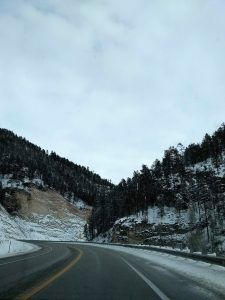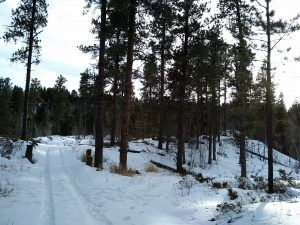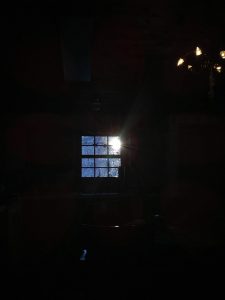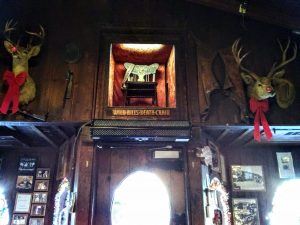by Lexi Lerner

I call on the evening of the winter solstice. Two mornings later, I find myself boarding a plane to the Black Hills of South Dakota, soon to turn white from a Christmas blizzard. I have never experienced these mountains or this state before. But I have experienced many blizzards, the first of which occurred the night I was born.
Well, it’s been building up inside of me
For – oh, I don’t know how long
“I’m disappointed,” I explain in a SoHo café two weeks prior. “I thought I could find what I was looking for – maybe not in Jersey, but at least in New York. The people, the questions. But we are constantly out of phase. The people I seek don’t want to be sought by me, and vice versa. There’s nothing I can do. It just isn’t here.”
The boy listening to me looks startled, and a bit sad. Or worried? I glance down at the table and realize my tea had jumped from my clenched fists. The one-table radius around us has no audible conversation.
“Sorry,” I say.
The waitress comes over. “Would you like anything else?”
The first billboard that greets you as you leave the eight-gate airport has a cartoon diplodocus on it, featuring a generous view of its behind. A speech bubble says: “Welcome to Rapid City! Now what?”
I don’t know why, but I keep thinking
Something’s bound to go wrong
In his book Sonic Alchemy, David Howard writes that “Don’t Worry Baby” – unlike its Beach Boys A-side “I Get Around” and other emblematic California Sound hits – “suggested something entirely more pensive and even slightly dark underneath its pristine façade.”
We exit the airport on Terminal Road. The cabin itself, a good hour away, is on Last Chance Trail.
There is no internet. And with the blizzard, the cell service is so poor that I can’t plan the logistics of where to next.
There is nothing to do but be together. Learn how to play cribbage, Yahtzee, Egyptian Rat Screw, word association games, letter permutation games. Stoke the fire, walk the husky.
In the word association game, psychoanalysis, boredom, obesity, and penguins keep recurring.
The food is hot and buttery and stays in your mouth. Dense gingerbread, butternut squash lasagna, eggplant parmigiana. We eat dinner in scrumptious silence and talk afterwards for two hours. Mealtimes flow as we move from the kitchen table to the living room couch to the table again.
We spend a whole evening making Christmas cookies that earn that title in intention only. In the morning the kitchen table looks like the organized vomit of merriment. The best ones are surrealist: hot pink snowmen with sour straw stripes, green gingermen with chocolate kiss bellybuttons, reindeer and sleds littered in sprinkles. You can tell a lot about a person by how intensely they take cookie decorating. Some create frosting palettes on their section of wax paper; others use plastic knives and toothpicks to finely tune their spreading; others literally throw ingredients at the cookies – and at each other – to see what sticks. And some, like me, decorate three, are disappointed with their work, and eat the rest.
 Three degrees Fahrenheit is doable when there is no wind and the sun’s blessing reaches you. Two layers of wool socks still don’t keep my toes from growing numb. “You look like a shadow,” I am told, because I am wearing all black. “Or a smudge.”
Three degrees Fahrenheit is doable when there is no wind and the sun’s blessing reaches you. Two layers of wool socks still don’t keep my toes from growing numb. “You look like a shadow,” I am told, because I am wearing all black. “Or a smudge.”
On one walk, he falls behind the others, pausing to stare down a white path. A pair of pickup truck tire lines skate into the vanishing point.
This town was once the most cosmopolitan in the western states, a sign in the visitor center boasts. It was the largest goldmine in the western hemisphere. Then the tunnels were converted to search even more inward than gold veins. First to find neutrinos – tiny particles that may explain why there isn’t more antimatter in the universe than there is. (Hold your hand out, the sign instructs – 10 trillion neutrinos pass through it per second!) Later, to detect dark matter.
Antimatter and dark matter are different. Antimatter is matter’s twin opposite: they “cancel out” explosively when they come into contact. But why there seems to be a lot more matter than antimatter, i.e. why there is something rather than nothing in this universe, is beyond us. (Hence neutrino studies.)
Dark matter is a whole other story. It’s “dark” because it can’t be detected electromagnetically, i.e. with light. But you can witness its gravitational pull, which is how we infer it’s there.
Naked trunk at eye-level: bears, clawing and scratching. Closer to the ground: elk, grinding their antlers. We read the places where tree bark has been stripped away to know who’s with us in these woods.
 A couple of texts I’ve received while here:
A couple of texts I’ve received while here:
“It feels like ages since I’ve seen you.”
“I’m typing replies to different parts of you and they all have the word ‘bittersweet’ in them.”
The service is not as bad as I’ve told them. I’d rather freeze time at the last text than risk messing up the delicate balance of communication further. But then the equilibrium of friendship is all lopsided, with them speaking to a wall of no-response, and me staring at the black mirror, crushed by the infinite crumbling of what if.
The walls of the cabin quietly give their advice.
On the refrigerator, a magazine clipping quoting Antonio Machado: “I dreamt – marvelous error! – that I had a beehive here inside my heart. And the golden bees were making white combs and sweet honey from my old failures.”
In the cabin’s throat, the sole corridor that connects the living room to the bedrooms, a list of Rules for Being Human: “There are no mistakes, only lessons.” “‘There’ is no better than here. When your ‘there’ has become a ‘here,’ you will simply obtain another ‘there…’”
And on the shelf of the bathroom cabinet, painted white on dark green wood, next to a porcelain polar bear: “If you’re lucky enough to be in the woods, you’re lucky enough.”
 Hovering above the Dakota plains is a periwinkle smog I know not how to reckon with. I hear the landscape is even more barren east of the Missouri.
Hovering above the Dakota plains is a periwinkle smog I know not how to reckon with. I hear the landscape is even more barren east of the Missouri.
In a Tumblr post that describes different personality types using oxymorons, mine is “alone together.” And that’s exactly what we are, plopped onto different chairs, reading different books, typing away into different devices, playing different games, but at least – for once, from all over the country, to be merry, to be Christmas – all in the same room.
But she looks in my eyes
“Alone together” also appears when she sits in the opposite armchair, folds her hands, and waits for me to share how solipsism has rendered me more suspicious and lonely and afraid than ever.
And makes me realize
Around the table we share our favorite flowers, and he picks Colorado columbines, the five-petaled blue bursts that follow him on cloud line mountain hikes.
“They look like they’re made of plastic,” he explains. “They can’t be real. But they are.”
Later that night, we compare personality test results. Apparently we both have the same penchant for authenticity. In fact, it is the first trait that defines both of us, mixed with an undefeatable sense of inner constellation.
“Darkness looms everywhere,” he tells me. “But if you look up at the sky, what do you see? More light than you could ever imagine.”
As she says, “Don’t worry baby,”
Two weeks ago, I listened to this song on repeat for an hour and a half straight, curled up and clutching my phone, the first time we broke up. You can hear it faintly in the background of a tearful phone recording I made, explaining to myself why under no circumstance! should I ever go back to you.
We were never really together, so we never really broke up. The next person you’re with, you told me, you’d marry.
The Black Hills ended with our second “breakup.” Or third? I can’t keep track anymore of what counts and what doesn’t.
Don’t worry baby
The most painful advice the cabin gives – for all the truth buried in its cliché – hangs in the entryway to the master bedroom. Snatched from Goodwill, a square painting of a typewriter loaded with a page that reads:
“I’d hate to spoil the ending for you, but everything’s going to be alright.”
Everything will turn out alright
When “Don’t Worry Baby” plays at the beginning of the film Déjà Vu, at the exact moment that line is sung, a ship explodes and kills over five hundred passengers.
 We head down the mountain and into town. In one of the oldest saloons, I see framed the Dead Man’s Hand: two aces and two eights, all black suits. The chair Wild Bill Hickok – the Dead Man himself – was shot in sits in an alcove above the door. It’s so close to the ceiling that it gives off the same discomforting air that shoes on a table do.
We head down the mountain and into town. In one of the oldest saloons, I see framed the Dead Man’s Hand: two aces and two eights, all black suits. The chair Wild Bill Hickok – the Dead Man himself – was shot in sits in an alcove above the door. It’s so close to the ceiling that it gives off the same discomforting air that shoes on a table do.
Wild Bill’s grave headboard hangs on the wall. It reads: “Pard, we will meet again in the happy hunting ground to part no more. GOODBYE.”
One can purchase the headboard shrunk down to a refrigerator magnet for three dollars.
There are dozens of mammalian heads – some I can identity, a surprising many I can’t – mounted to the walls, and even more taxidermied bodies on the shelves. The deer heads have cheap red noses stuck on them, and wreaths with red bows around their necks.
Don’t worry baby
Glass is everywhere. In this mutant coffee shop-glass studio combination, on every tenable vertical surface hangs 1950s metal signs with cheeky phrases; and on every horizontal are glass figurines of every kind – glass orbs, glass snowmen, glass horses. Step outside and the air itself is made of the glass dust of snowflakes too small to call snowflakes.
A couple str eets away, there is a curated secondhand store – more the owner’s dream house than a true shop – that holds myriad kinds of stained glass. Everything from repurposed window frames to cathedral windows, refracting rainbows out of flowers, mountains, geometric shapes, a goddess sitting on a moon. The owner tells us that one of the artists offers lessons to anyone from pairs to groups of twelve. And that the art of glass is not as hard as it looks. “Glass is forgiving,” she says. Especially if you use grout instead of lead. Then the shards don’t have to fit together equidistantly at every edge; the grout will fill in the gaps.
eets away, there is a curated secondhand store – more the owner’s dream house than a true shop – that holds myriad kinds of stained glass. Everything from repurposed window frames to cathedral windows, refracting rainbows out of flowers, mountains, geometric shapes, a goddess sitting on a moon. The owner tells us that one of the artists offers lessons to anyone from pairs to groups of twelve. And that the art of glass is not as hard as it looks. “Glass is forgiving,” she says. Especially if you use grout instead of lead. Then the shards don’t have to fit together equidistantly at every edge; the grout will fill in the gaps.
She is determined to memorize “Desiderata,” that famous poem from the 1920s, but must have misplaced her copy of it in one of her books. Nonetheless its spirit is quoted in bits throughout the week.
“With all its sham, drudgery, and broken dreams, it is still a beautiful world. Be cheerful. Strive to be happy.”
Apparently, some recitations by famous people replace “cheerful” with “careful.”
Sweeping the cinders is one way I am able to help, or at least care for what I burn. On the last night, in my eagerness to keep the fire roaring, the cabin warm and myself useful, I add one log too many. The fire alarm blares and she comes out of her room, coughing up smoke as she finds a chair to stand on. “Don’t worry,” she says.
Don’t worry baby
I’ve heard it so many times, I’m nearly sick of myself.
“First, I was asking, ‘What makes a good doctor?’ That’s why I took the year off. To find out before medical school. But that became less useful, more derivative. So then I asked, ‘What makes a good person?’ And then it was, ‘What’s a person?’ But now I’m down to, ‘What?’”
“You know those pictures you took of me in front of the glass studio? They’re better than any I took today.”
“Will you send them to your parents?” she asks.
“Yes, to prove I’m going outside and having fun.”
“Do they think you’re suffering?”
“On what level?” I laugh.
She pauses. “Because you’re in South Dakota, you can’t be having fun?” Another pause. “You have to find fun.”
Another text: “What’s the point of going if you don’t enjoy yourself?”
Don’t worry baby
The Denver airport is so loud. And there are so many people. So many walkways, lights and sounds. Peace seems even further now.
“Know where you’re going?” the conductor asks.
